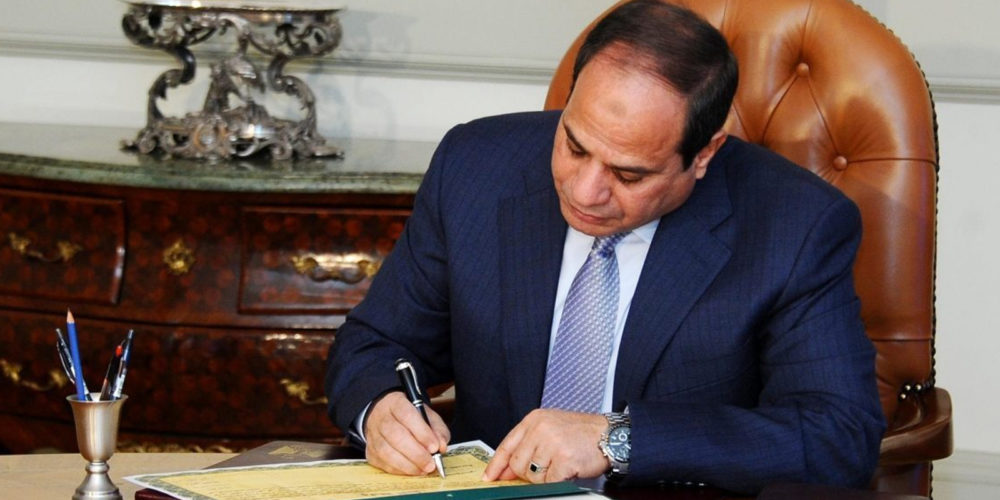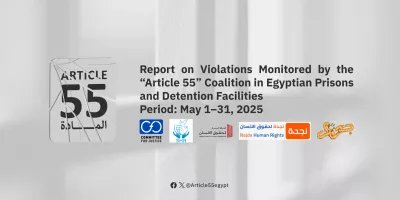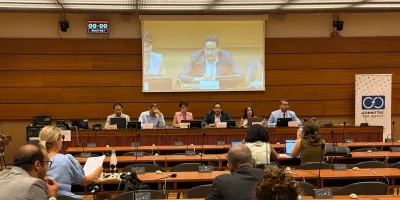Egypt’s recent approval of Law No. 3 of 2024, on ‘securing and protecting public and vital facilities’, raises concerns about the increasing dominance of military authority over civilians in the country—which amounts to the militarization of the state, the Committee for Justice (CFJ) said.
The law, approved by the House of Representatives and officially published in the Official Gazette on February 5, 2024, exacerbates the existing crisis surrounding political and fundamental freedoms in Egypt. It also infringes on various international conventions and covenants to which Egypt is a signatory, which emphasize the obligation to ensure that the accused are brought before a fair and impartial judiciary.
Comparatively, Law No. 3 of 2024 represents a more severe violation than its predecessor, Law No. 136 of 2014. The latter was enacted for a limited two-year period and under specific exceptional circumstances. In contrast, the newly enacted law lacks such constraints, embodying a permanent character that raises concerns about its enduring impact. Its broad and ambiguous terms, coupled with the extensive powers of judicial control granted to members of the armed forces, create a worrisome scenario where the door is opened wide for more military-led (exceptional) trials of civilians.
Additionally, the law bestows not only the authority for judicial control and referral to the military judiciary in cases involving attacks on public and vital facilities but also extends to matters that may jeopardize the fundamental needs of society, such as food products, and other essential components crucial to the functioning of the state or meeting national security requirements. Such determinations are made through a decision issued by the President of the country or his delegate, following consultation with the National Defense Council.
CFJ underscores that the fundamental principle of safeguarding public facilities traditionally falls under the jurisdiction of the Ministry of Interior, a civilian ministry. Public facilities, defined as places frequented by civilians and integral to their natural movement, are subject to the Egyptian Penal Code, which provides adequate organizational measures for crimes committed within them. This arrangement ensures that cases related to such crimes are adjudicated by the natural judiciary, preventing civilians from being subjected to military trials—an outcome deemed detrimental to the jurisdiction of the ordinary judiciary in matters within its purview.
It is noteworthy that the amendment to the Military Justice Law on February 2, 2014, had a significant impact on the surge in military trials in Egypt, as it transformed military courts to mirror natural courts, resulting in the establishment of a misdemeanor court, a court for appealed misdemeanors, a criminal court, and the creation of the Supreme Military Court of Appeals. Recently, there has been further modification to the functioning of the Military Court of Appeals, allowing it to hear appeals before they are brought to the attention of the Supreme Military Court of Appeals.
In 2014, President Abdel Fattah al-Sisi enacted Law No. 136 of 2014, on the protection and security of public and vital facilities. This law was subsequently replaced by the recent legislation, as its articles were expanded, broadening the scope of military justice to encompass numerous crimes that were traditionally within the purview of civilian courts. This shift led to a substantial increase in the number of civilians subjected to military justice, with 11,465 individuals appearing before military tribunals from July 2013 to the end of December 2017, as documented by CFJ.
Several lawyers who represented clients before the military judiciary reported being denied access to the accusations report or the opportunity to photocopy case documents. The investigative process within the military prosecution was criticized as a “sham” stage, where the defendants’ statements were alleged to be predetermined, provided by either the Public Prosecution or the State Security Prosecutions. Even in court, the swift dismissals were perceived as a result of the judge’s perceived success, irrespective of the pursuit of justice.
In response to the observed violations, the Egyptian Constitutional Court issued a landmark ruling in 2017 stipulating that civilians accused of offenses under the protest law could not be subjected to military trials, as the law previously mandated their referral to military courts and military justice.
The CFJ expresses concern that the introduction of the new law may lead to a surge in military trials of civilians. The military judiciary lacks recognized standards of justice, being characterized as “exceptional.”
Furthermore, CFJ contends that the law effectively serves as a covert revival of the infamous Egyptian emergency laws. Despite the official cancellation of the emergency law, the new legislation reintroduces similar provisions by allowing the military justice system to handle crimes occurring on public and vital facilities, as well as manipulation of essential services and goods.
Therefore, CFJ advocates for the immediate suspension of Law No. 3 of 2024, due to the adverse political, legal, and societal effects of the law. Instead, CFJ proposes relying on existing articles within the Egyptian Penal Code that already safeguard public and vital facilities, prescribing deterrent penalties for those attempting to attack them.
Moreover, CFJ recommends transferring all cases that have been sentenced by the military and those still under consideration before the military judiciary to the Public Prosecution or the natural judiciary. This ensures a fair trial process based on the Egyptian Penal Code, allowing defendants the right to a proper legal defense against the charges they face.
In addition, CFJ calls for the immediate release of civilians who have been sentenced by military courts, and urges President Sisi to issue a decision to annul sentences handed down by military courts against civilians. The CFJ emphasizes the need to adhere to the rules for ratifying sentences outlined in the Code of Military Justice, specifically referencing articles 98 to 116, with special attention to the fourth item of Article 99. The CFJ proposes that this decision to annul sentences should cover the period from February 2011 to the present.
Finally, CFJ urges the Egyptian authorities to amend Article 204 of the constitution to explicitly prohibit civilian trials before military courts.






